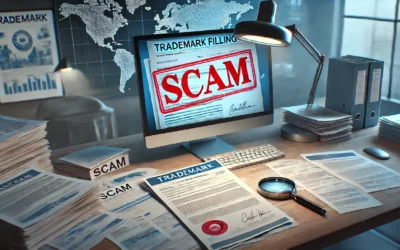Can you trademark a QR code?
Are QR codes like other figurative elements that can be protected with trademark registration? It is possible to trademark many different types of figurative elements. They can be relatively simple, or very complex. Below are some examples of registered EU trademarks:
The basic requirement for registering a trademark is that it is “distinctive”. It cannot be directly descriptive of the products (e.g. TASTY for cookies) or a sign that would not be perceived as an indicator of commercial source.
For example, very simple figures or geometrical elements cannot be protected as trademarks, as they would not be perceived as commercial symbols. Here’s an example of a trademark refused in the EU:
International registration No. 1091415
What’s the problem with QR codes?
There are several reasons why applications for trademarks consisting of just a QR-code would be rejected.
The most obvious is the lack of distinctive character. A QR code is not perceived as the kind of symbol that indicates a commercial source. If a person sees Lacoste’s crocodile, Adidas’ three stripes or Nike’s swoosh, she will consider those symbols to be commercial indicators. Now, imagine that you see a t-shirt bearing a QR-code. You would probably think that a particular company “owns” the image of a QR-code. It would be considered more as an ornament than a commercial symbol.
The second reason is that it is not possible to trademark names or symbols that are “customary” in ordinary commercial practices. This would cover for example simple pictograms or other symbols. The EU trademark office has refused the below trademark because it is (or resembles) the international voltage sign:
EU trademark 009894528
It is likely that a QR symbol would be considered a symbol that has become customary in commercial practices, and as a result, would not be registrable as a trademark.
The third reason for not accepting a QR code as a trademark is that it is not possible to register trademarks that are contrary to “public policy”. QR-codes are technical communication tools and serve a useful purpose. It could be argued to be against public policy to give one company a monopoly over QR codes. Even though each code is unique, so a registered code would be different from all other QR codes, each code is very similar. A person could not distinguish between two QR codes, especially if they are seen at different times. Two different QR codes would be confusingly similar, so to allow a company to register a QR code as a trademark would effectively give them exclusivity for all QR codes for a particular product category (same and similar products).
So HOW could you register a QR-code?
It is possible to register a QR code as a part of a trademark. Here are some examples of registered EU trademarks containing a QR code.
EU trademark 10688505

EU trademark 10743301
EU trademark 12380895
These registrations do not give a monopoly over the image of a QR code. The first two examples contain real, functional QR codes, whereas the last one is a non-functioning “dummy” image. The registration would enable the owner to prevent another company from having a similar logo with the same or a similar QR code. The marks would have to be similar in overall appearance, the mere fact that two marks contain a QR code would not suffice. In the above three examples, all three marks are clearly similar despite them all containing a QR code. They all have distinct verbal and figurative elements, so they would not be considered similar overall and could co-exist.
So QR codes work like any other figurative element in a logo. Without further elements (words or figurative) they cannot be protected as trademarks but can be incorporated into an otherwise distinctive logo.



